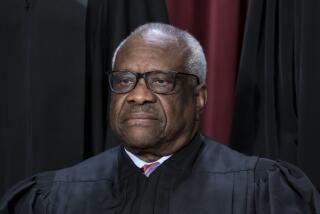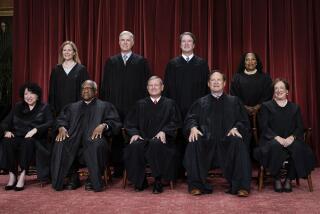Senators Have Hang-Ups With Clinton Calls
- Share via
WASHINGTON — Senate investigators sought Wednesday to show that President Clinton was being deceptive when he claimed that he could not recall making fund-raising phone calls from the White House.
Republicans on the committee chaired by Sen. Fred Thompson (R-Tenn.) commended businessman Richard Jenrette after two hours of testimony in which he acknowledged receiving phone calls from Clinton in 1994 and from Vice President Al Gore in 1996 asking him for political donations.
Jenrette told the Governmental Affairs Committee that he wrote five checks totaling $50,000 to the Democratic National Committee after the president called him to say that he wanted to raise a total of $2 million “from 40 good friends”--an average of $50,000 apiece.
Thompson and two other Republican senators--Don Nickles of Oklahoma and Robert C. Smith of New Hampshire--told Jenrette that his “candid testimony” had cast doubt on Clinton’s forthrightness in saying that he may or may not have made fund-raising calls.
The president has said repeatedly that he cannot recall soliciting donors by phone from the White House but would not deny the possibility. But he has added: “I believe what the vice president did and what I did was legal and . . . within the letter of the law.”
Jenrette’s testimony, which paralleled an account that he gave reporters earlier this year, takes on added significance in light of Atty. Gen. Janet Reno’s decision to review whether the Clinton and Gore phone calls may have violated a legal prohibition against raising campaign funds in a federal building and should be investigated by an independent prosecutor.
Senate committee lawyers said the White House provided them with telephone records Wednesday indicating that Clinton’s call to Jenrette was made from a private line in the White House residence, which some authorities claim avoids even the slight chance that he may have violated campaign restrictions.
Jenrette, who recently retired as chairman of Equitable Life Insurance Co., said Clinton’s call came in October 1994, before congressional elections in which Democrats fared badly. Gore phoned him in February 1996 to say “we want to get an early start [on the 1996 campaign] and we hope that you’ll help us,” he testified.
Jenrette subsequently sent four checks totaling $25,000 to the DNC, according to Federal Election Commission records.
Nickles remarked that “the president has never admitted” that he made such phone calls, even though they may have been within the law. Smith told Jenrette that he wished Clinton had been “as candid as you are.”
The committee obtained “call sheets” that White House aides prepared for Clinton to use in making telephone solicitations, but Senate staff members have been unable to find anyone other than Jenrette to acknowledge receiving a fund-raising call from the president.
In other action Wednesday, Thompson and Michael J. Madigan, his chief counsel, gave White House lawyers a face-to-face dressing down, accusing them of failing to conduct thorough searches earlier this year for videotapes of White House coffees attended by Democratic donors.
About 66 videotapes of coffees, political rallies and other campaign-related receptions were turned over to the panel three weeks ago.
Madigan said such materials had been sought in subpoenas as long ago as April.
Michael Imbroscio, an attorney in the White House, said his “honest, good-faith efforts” to locate all relevant materials had been only partly successful. But he emphasized that tens of thousands of records had been furnished to the committee over a period of months.
Citing another example, Thompson said the panel recently learned that a computer diary containing all details of the president’s phone calls, his visitors and his daily schedule had never been furnished.
However, White House Counsel Charles F.C. Ruff insisted that the computer record was only “an index” of thousands of underlying records that already had been surrendered to investigators.
“This computer index is a mirror image of critical pages of the president’s schedule, phone logs and briefing books that have been provided to you,” he testified.
More to Read
Get the L.A. Times Politics newsletter
Deeply reported insights into legislation, politics and policy from Sacramento, Washington and beyond. In your inbox twice per week.
You may occasionally receive promotional content from the Los Angeles Times.










